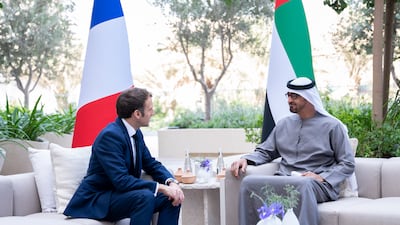"Part of our security is played out in the Middle East," French President Emmanuel Macron said on Friday, as he began a two-day visit to the Gulf. Mr Macron's tour of the region began with a meeting with Sheikh Mohamed bin Zayed, Crown Prince of Abu Dhabi and Deputy Supreme Commander of the UAE Armed Forces, in a trip that included a visit to Expo 2020 Dubai.
Over the course of Mr Macron's presidency, France has deepened its diplomatic ties with its Arab partners, reflecting not only a growing recognition of the positive role that Paris can play in the Arab world, but also the necessity to pay heed to regional voices in the process. As Mr Macron's words suggest, affairs in the Middle East and the West do not occur in isolation. A host of challenges – from an ongoing migration crisis to the proliferation of armed extremist groups – are shared by both regions, and require joint strategies and common resolve to address.
Some of these challenges, of course, are not new; they have festered for many years, and have sometimes been further complicated by external actors underestimating their importance. France has distinguished itself in this regard by keeping them front and centre in its foreign policy, even when it has been difficult to do so. It has played a leading role in unifying the regional security agenda, carrying out joint exercises with Greece and Egypt in the Mediterranean and the Red Sea. It has conducted similar exercises with the UAE in the Gulf, aimed at keeping important commercial maritime routes safe and strengthening the region's defences against terrorist groups like ISIS.
In line with these security partnerships, among the highlights of Mr Macron's visit to the UAE was a deal worth almost $19 billion, in which France would supply the UAE with 80 Rafale fighter jets and 12 Caracal H225 helicopters.
Other shared challenges go beyond the scope of defence partnerships. The list of potential areas of co-operation between France and the Arab world has grown to include economic recovery, environmental stewardship, technological innovation and food security.
In developing his country's ties with Gulf states, Mr Macron has put a special emphasis on these areas. Alongside the defence deals, Mr Macron's visit to the UAE also resulted in comprehensive economic agreements worth $17bn, including the creation of a $3.6bn "French-Emirati Fund Partnership" to develop French enterprise. Abu Dhabi-based sovereign wealth fund Mubadala is also planning to invest nearly $1.6bn in the French economy, including in sectors such as energy, semiconductors and space exploration. The UAE Ministry of Climate Change and Environment and the French Ministry of Agriculture and Food also signed an MoU to develop "sustainable and resilient food systems in both countries".
Mr Macron's visit to the Gulf, though brief, has put France's role in the Middle East back into the spotlight. It has reminded the world how important international partnerships are to achieving greater stability. As the world seeks to emerge from the Covid-19 pandemic and turn its attention to broader issues, such as climate change, its leaders must bear in mind that stability – whether in the Middle East or Europe – is a holistic endeavour, one that goes well beyond security co-operation.


